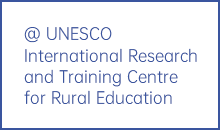Background
The Rural Community Learning Centre Capacity Building Project (CLC Project) was established in 2004, continuing the project implemented in Guangxi, Yunnan and Gansu provinces from 1998 to 2003 by UNESCO Multisectoral Regional Office in Bangkok (UNESCO Bangkok). Guided by the concept of lifelong education and learning, the CLC Project has organized and conducted many educational activities, including adult cultural education, production and life skills training, environmental education, innovation and entrepreneurship skills training, etc. These initiatives have contributed positively in eliminating poverty, promoting economic and social development, and improving people's scientific and cultural knowledge and living standards.
The current state of CLCs
Rural CLCs are usually located in marginalized areas and generally face challenges such as insufficient funds, weak teaching staff, low participation, and lack of management mechanisms. In addition, non-formal education, adult education and community education are often given lower priorities within most national education systems.
Emerging opportunities for CLCs
Education plays a fundamental and leading role in rural revitalization, thus rural education must be prioritized. With rural revitalization as a major national strategy, the increased attention paid to rural areas has created new opportunities for the high-quality development of community learning centres.
Population aging is an important trend in global population development, especially in rural areas of China, where it far exceeds urban areas. In coping with this challenge, CLCs, as a form of non-formal education, will play a greater role than formal education.
With the rapid development of China's rural economy has created an urgent need for rural residents to lead a more fulfilled life. “Learning to be” has become more important than ever. Community learning centres play a flexible role in meeting rural residents' rapidly changing learning needs.
The CLC project outlook
The UNESCO International Research and Training Centre for Rural Education (UNESCO INRULED), in collaboration with the China Adult Education Association, has submitted a project proposal to the Secretariat of Chinese National Commission for UNESCO and the UNESCO Beijing Office to kickstart the next project cycle of the CLC project. The project team seeks to strengthen the cooperation network in the new cycle, jointly carry out research, knowledge exchange, and capacity building to support the vast number of CLC practitioners and to make rural community learning centres a catalyst in building learning societies and achieving lifelong learning for all.













